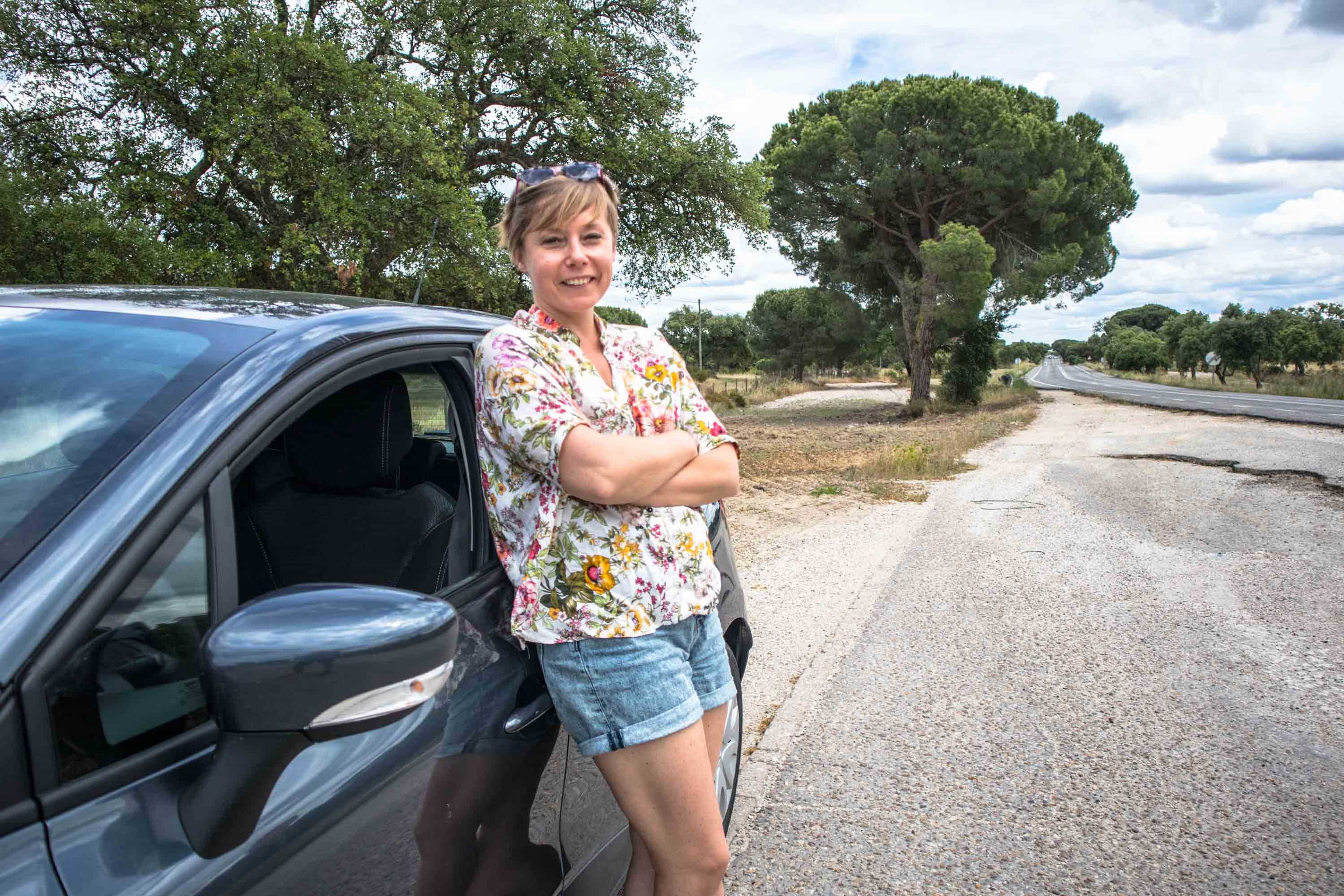
Travel
Renting a car in Portugal: An easy and cheap way to see the country
Destinations
Joanna Horanin
Hi, I'm Joanna, the author of The Blond Travels. In the worlds of Thailand and Portugal, I feel like a fish in water - and it's no coincidence! I've been exploring Thailand for over a decade, and I've settled in Portugal for 6 years now. My mission is to support Dreamers - just like you - in discovering these fascinating countries and helping those in love with them find their own place on Earth, preferably for good! Let's uncover these unique corners of the world together.
Renting a car in Portugal is a great way to see the country. Having the four wheels at your disposal allows you to get to the hidden corners of the country and getting off the beaten track. Let’s find out how to rent a car in Portugal – cheap and fast!
Writing this post, I don’t have my own car. It will change soon but until then I’m relying on car rentals. We have rented a good few cars so far. We have been north and south and spent a few days driving around Lisbon and surrounding areas. I do not have such bad experience but I know that local regulations and formalities may seem hard to evade and when you don’t know exactly what to avoid, the costs of car rental may be much higher than expected.

The essential guide for a trip to Lisbon. This handy ebook guide includes everything you need to know and see in Lisbon. Discover the best sights, restaurants, cafés and accommodation in the city. Make the most out of your trip! Find out more
Driving around Portugal in your own car is a great idea to spend your holidays. If you want to know how to deal with renting a car quickly and cheaply, read on. I am sure that after reading this post everything will be a lot clearer.
Why is renting a car in Portugal worth it?
I think the main advantage of having 4 wheels at your disposal in Portugal is that you can get almost anywhere. Unfortunately, transport here is poorly developed and sometimes getting to smaller villages and towns is really hard and difficult. A car will help you see hidden beaches, picturesque towns, and wind through the beautiful byways of the country.
With a car, you can visit truly amazing places far away from the tourist chaos.
It will also save you a lot of time. Getting from Lisbon to a smaller town in the north takes about 5 hours if there is direct access and you have to remember that there often isn’t one. It should take around 3 hours by car (if you are not making any longer stops). Not to mention that when using public transport, you have to get to the station, find the right stop and wait for the bus or train. Having a car, things are much easier and quicker.
Driving in Portugal – What you should know
Before you jump into the car and start the engine you must know a few very important things.
Documents and formalities
To be able to drive a rented car in Portugal you have to have on you:
- Your driver’s license
- Your ID or passport
- The contract from the company where you rented the car.
Apart from that, in the car there have to be:
- A spare tire
- A high-visibility vest
- A warning triangle
- A spare light bulb
Safety on Portuguese roads
I constantly see comments on Facebook saying that the Portuguese drive like madmen. I don’t know if I agree. You know how it is on roads everywhere in the world – you will always find a crazy driver who wants to show off. Not everyone respects the rules, they space out or can’t drive at all. I don’t know if it is because I have lived for so many years in Thailand, where traffic and its rules are left to the interpretation of their users, or because I also know first-hand how terrible traffic is in England, where you cannot miss the stereotypical phlegmatic Englishmen, but I think the roads in Portugal are quite safe and that driving here is pleasant.
I believe roads in Portugal are safe but I would advise using public transport in bigger cities.
As a rule, the Portuguese are nice and helpful to each other on the roads. Yes, it’s true that you can hear the horn a lot more often than in Poland, but I think that the drivers are not as agitated and rude as in Poland.
Collisions can be seen pretty often on the roads which can be worrying but usually, they are just small bumps, not accidents. From what I have noticed the Portuguese have a problem keeping the distance between cars and that’s how they end up bumping each other. Try not to break too rapidly especially if you are in a traffic jam.
Watch out! The Portuguese like to drive after drinking a few beers. Drunk driving is common here. Be sure to be extra careful, especially at night!
Roads and speed limits
The quality of highways in Portugal is extremely good. There are no bumps, they are smooth and very well organized. One thing that might be weird and troublesome to people from other parts of Europe is the fact that speed limits are very badly marked. Sometimes you don’t know how fast you can go and a couple of kilometers later, the signs with different speed limits appear every 5 meters. The usual speed limit on Portuguese highways is 120 km/h.
Expressways outside cities are always strangely empty. Obviously, there is always increased traffic around Lisbon but the further away from the city, the smaller the traffic. Once while traveling to Algarve we were alone on the road for 3 hours. It certainly makes driving on highways a lot easier.
Tolls
Practically all expressways and highways in Portugal are paid. The tolls vary.
You can pay the tolls in the booths on the road. If you choose this option make sure to have cash on you. Foreign cards often do not work.
The second option is to buy from the rental place a special small box, which charges the cost of using the road and you don’t even have to stop at the booths! See below how exactly it works.
Driving in cities and parking
I would advise against riding in cities. Lisbon and Porto are not only crowded, especially in the season, but also have very narrow streets. It’s really easy to scratch the car. So it’s better to leave it in the suburbs.
Leave the car in the suburbs around big cities.
Double parking is a standard in Portugal. It’s very possible that someone will block your car. What can you do in such a situation? My neighbours just get in their car, start honking and don’t stop until someone comes and takes the car blocking the way. It may not be the nicest solution but it certainly works.
Careful when buying fuel
We have personally experienced that it’s very easy to make a mistake buying fuel in Portugal. Remember! Petrol/gasoline is called gasoline and diesel oil is gasóleo. Petrol is marked green and diesel yellow.
The prices of fuel in Portugal are pretty high. A full tank may cost you about 50 euros.
How to rent a car in Portugal – Practical advice
If you have decided to rent a car in Portugal I won’t keep you here any longer. Here’s how you can rent a car – cheap and fast.
How to find the right car and car rental in Portugal
It’s extremely easy now. You just need to google “car rental in Portugal” and you’ll get thousands of websites. People who speak Portuguese may be able to find cheap car rentals.
Looking for a car to rent I always use Discover Cars. It’s a comparison engine useful in any country. Rentalcars will help you find the best prices and best car rentals, book everything fast and it will show you all the hidden costs before you click “buy”.
Start early
The earlier you start looking for a car the better. The rates are very low then. Last year we managed to rent a car for 5 euros a day but we started looking 2-3 months earlier.
Looking for a car long before your trip will pay off especially if you’re planning on visiting Portugal during the high season when the prices go up.
Where is the best place to rent a car in Portugal?
There are a lot of car rentals in Portugal. The most popular ones can be found at the airports. I know from my own experience that renting a car at the airport in Lisbon is cheaper than renting in the city but you will definitely have to compare prices.
In Portugal, you will find smaller car rentals and big ones like Europcar or Hertz. Those well-known are always more expensive.
I always choose the cheapest options. The best offer I found was 5 euros a day! I often choose Interrent as well, which offers good prices.
Car rental opening hours
Some car rentals are open 24/7 but it’s best to check them earlier. Some of those close at 7 or 8 pm and on Saturdays even at 1 pm. If you’re late returning the car you’ll pay a fine.
Payments, formalities and hidden costs
Renting a car in Portugal often involves additional formalities (in some companies) and also hidden costs. Here’s how to avoid them.
Credit card and insurance
All car rentals offer insurance and it’s already added to the rental price. It is usually around 1,000 Euros or more, which you have to pay yourself in case of an accident, even if it wasn’t your fault. The rest is covered by the insurer with whom the rental company has a signed contract. Unfortunately, there is often no information about this on the rental site, where the cost of rent is given.
Rental companies offer accident insurance and you can buy it extra. The cost is 15-30 euros per day (you also won’t find that information on the websites where the rates are given), which can sometimes be equal to renting a car! And here, a warning – this sum does not cover the entire insurance, but only reduces its value. In case of an accident, you will still have to cover a certain percentage of the total cost.
To rent a car in Portugal you need to have a credit card. The car rental freezes the value of the insurance on the card in case of an accident which they return later after you have returned the car (if returned without damage). Even if you decide to buy the car rental’s insurance this deposit is still required. If you don’t have a credit card, you won’t be able to rent a car.

Explore your next holiday destination at your own pace with a rental car. Hit the open road and discover hidden gems and off-the-beaten-path destinations. Rent a car with Discover Cars at the best market rates!
Buying insurance from the rental company significantly increases the cost of renting. So what can you do to avoid this? Buy separate insurance before leaving. Very often travel insurance offers this option. You can also check if your credit card covers these kinds of costs. By buying separate insurance you significantly reduce the cost of renting a car in Portugal.
In case of an accident the car rental will keep the deposit they froze on your credit card and you can retrieve it by contacting your insurer. There is an option of renting a car without a credit card but only in small car rentals. Unfortunately, I don’t know any of those. I advise you look on Facebook groups for some advice on this.
Fuel fees
The rented car should have a full tank. You have two options – return the car with a full tank or with what you have left. In the second option, you will have to pay additionally for a full tank. I recommend the first option – you will only pay for what you used.
Tolls
As I have mentioned before, all expressways in Portugal are paid. You can pay in the booths or buy a special box that you hang on the mirror and it gathers all the information about tolls on paid roads.
The cost of such a box is 1,5 euro a day plus all the tolls. In my opinion, it gives you a lot of freedom. You don’t have to wait in queues on the road, you just drive a special lane.
All the tolls are paid from your credit card.
You can also pay upfront in the car rental. It’s the most expensive option but it certainly is the most convenient and time-saving one.
Additional driver
When you book a car, be careful. The data you enter should correspond to the driver’s data. You pay extra for each additional person who drives the car. Depending on the company, it is 7-10 euros.
Return the car in the same place
Set your itinerary so that you pick up and then park your car in the same place. For example, if you rent a car in Lisbon and then want to park it in Porto you will pay a lot more.
Cancellation
Some sites and rentals offer free cancellations. Rentalcars, which I mentioned, gives you this option up to 48 hours before arrival.
Renting a car in Portugal is very easy on the one hand. You go to the website and book. All hidden costs, however, often make car hire stressful. I hope I helped you and thanks to this article you won’t have any unpleasant experiences. If I forgot something, let me know!
If you have any questions, doubts or want to share your thoughts leave a comment!
This post contains affiliate links. This means that by renting a car from Discover Cars through the link in the post you do not pay extra, and I receive a small sales commission. If you liked this post and want to support me, book a car with Rentalcars!